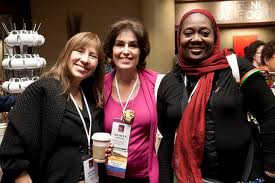Has NBCC Lost Its Way?
I’m currently reading letters sent to me by community college students in Utah who watched Pink Ribbons, Inc. and have questions about become activists. Many of these students wonder how they might become activists if they are poor. I will tell them that activism doesn’t require money. But the National Breast Cancer Coalition (NBCC) seems to think differently. And that is way too bad.
I’ve written about NBCC before. I even devoted a whole blog post to the organization,
entitled “NBCC: The Promise, the Process, and the Problems.. I stand behind everything I said in that post, but NBCC’s most recent move has me wondering whether the organization should shut its doors.
Here’s the deal. NBCC is known in the breast cancer world for, among other things, hosting an Annual Advocate Conference in the spring. People come to network, hear speakers and panel discussions on relevant breast cancer topics, get oriented on NBCC’s legislative agenda, and lobby members of Congress on that agenda. While I have never attended this
conference, I’ve heard lots of good things about it over the years. There was a fee for attending (that ranged from $125 to $245 depending on how far in advance you registered and whether you were an NBCC member or not) and scholarships were available.
This year NBCC has changed the name of its conference to “Breast Cancer Deadline 2020 Advocate Leadership Summit.” To attend, leaders have to raise or give a $1000 donation to NBCC. So, for the opportunity to lobby Congress on the ridiculous “breast cancer deadline” that NBCC has set, you have to pay big money.
I’m sure NBCC has a justification for this fundraising ploy, but it turns activism on its head. You shouldn’t have to be rich or have wealthy friends to be an activist or an “advocate leader.” What you need is heart and commitment, and others who share — or might be persuaded to share — your view of the world.
If NBCC is having money troubles, could it be an indication of doubt on the part of donors in the organization’s mission or direction? In any event, to try to solve money troubles on the backs of people who are working hard on breast cancer issues is wrong-headed. If this approach means many fewer people at the NBCC conference, maybe the organization will re-think its approach. In any case, NBCC is turning their conference into a very different event than it was. I have trouble believing this conference will be a success.
Whether it’s a success or not though, I firmly believe that to require a donation of $1000 for a breast cancer advocacy conference is simply wrong.
As 2020 approaches, I hope some people will remember that was the deadline that NBCC set to end breast cancer forever. If NBCC is still around then, ask them what happened to the deadline. Maybe it will die with this year’s conference.
© Barbara A. Brenner 2013




I couldn’t agree more. It is a strange thing to ask people to pay an exorbitant amount of money in order to do what citizens have a right to do. When there is a message that only people of a certain socioeconomic level can attend, there is something wrong. And I don’t want to hear about “available scholarships” either. Good people who want to affect change, shouldn’t have to jump through hoops to participate in such conferences. It should be easily available to the PEOPLE.
Hi Barbara. The $1000 quid pro quo is horrifying. Certainly cuts me out. I didn’t go last year because I am so uncomfortable with the deadline 2020 campaign, and the soft pedaling of environmental exposures, and the having presentations year after year on health care reform with panelists ranging from DLC to the right–no one favoring single payer. It has, however, been a great place to meet people from around the country and find out what’s happening, and also to hear some cutting edge workshops on new research, where you can really have a discussion. The thing is that scholarships to both Conf and Project Lead, where I got some good trainings, are paid for with pharma and perhaps other not so green dollars. If your supposition about money drying up is correct, it may be a shortage of these dollars, and one woders why. Thanks for raising this. As always you are on point. Best to you.
Barbara, I very much appreciate this post. I have been personally supportive of the deadline and even asked my organization to formally support the effort (we have not so far, for many of the reasons you list). I was appalled when I learned I would need to raise $1,000 to “buy” a seat at the table. We collaborate with many women at grassroots organizations, who are in ongoing treatment or have dire financial situations because of completed therapy, and I thought, what about those women? I’m frustrated but not entirely surprised by the new strategy, since it can be impossible to work with NBCC unless you or your organization wholly supports everything it does. I’m disappointed, since I do appreciate the idealism behind this campaign.
As a board member of NBCC, I am a great believer in The Breast Cancer Deadline 2020. The Advocacy Conference is not happening this year. Instead this year we are doing a Leadership Summit. It’s quite a different program open to those who wish to be leaders in the deadline campaign. The advocacy conference attended by 700 or more advocates was a very different program. The Leadership Summit will be attended by 250 leaders who wish to work toward the goal of ending this disease by January 1, 2020. It’s program goals are listed at http://www.breastcancerdeadline2020.org.
NBCC has a strategic approach toward ending breast cancer. It includes collaborating with researchers to support the search for what causes breast cancer and how we can prevent metastatic disease. It calls for partnerships and support by everyone who believes we need to end this disease. It asks that everyone involved focus their resources on the two main goals of preventing breast cancer and metastasis.
NBCC is the organization responsible for the $2.7 billion dollars in research through the Department of Defense Breast Cancer Research Program. It’s the organization that lobbied to turn the CDC detection program into a treatment program so that women had a means to treat the disease that the government was screening for. Before our activism there, that program was a cruel joke for anyone diagnosed with breast cancer. In addition, NBCC has educated thousands of women through Project LEAD. (Many Breast Cancer Action Activists have taken advantage of this education course and they do good work as a result of it.)
NBCC has incredible resources available on their site for anyone who wants to benefit from their educational materials at http://www.breastcancerdeadline2020.org and that is all free. I have never been one to raise thousands of dollars to walk in walks, but I am proud to raise money to support Breastcancer Deadline 2020.
Joy: so what you are saying is that only people with money are capable of being leaders?
Not what I said….and Lobby Day is free to everyone who wants to join us.
Only if you want to be a leader do you need money or friends with money.
Lobby Day is open to anyone who wants to lobby Congress on the NBCC deadline.
I should point out that anyone can contact their Congressional representatives at any time, on any topic.
Joy, you I know each other. I would expect you, as a board member of NBCC to fully defend their positions. But to claim that all who want to lead on what many people (not just me) see as a ridiculous deadline can come to the summit this year ignores the $1000 requirement.
I will be dead before 2020, but I can promised you that the deadline won’t be reached.
As for NBCC controlling DOD research money, I have two thoughts. 1) These are public dollars, why should a non-profit control them? 2) The mission of the DOD program has changed so many times that it’s hard to keep track. But the successes they now claim are claimed by almost every organization that funds breast cancer research now. You should look at the history of that program.